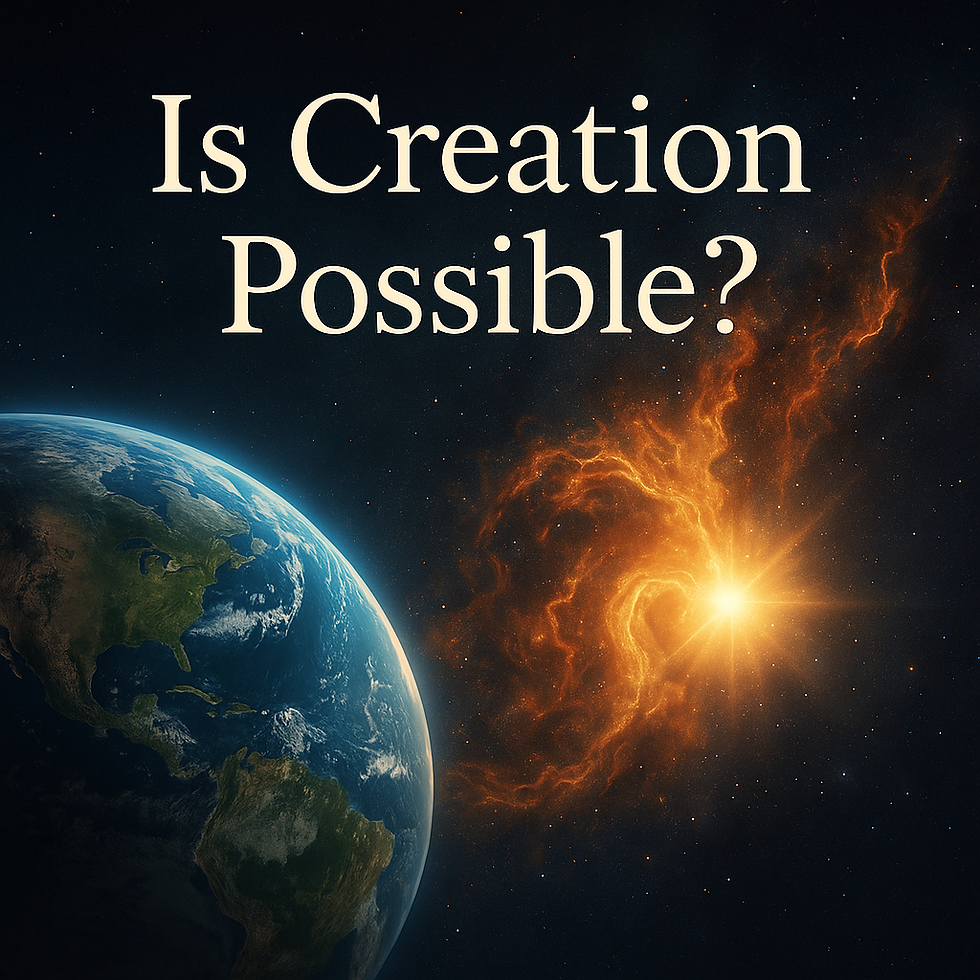Is Creation Possible?
- Michael Fierro

- Aug 7, 2025
- 3 min read
For much of human history, the idea that the universe was created — that it had a beginning — was far from obvious. Ancient Greek philosophers like Aristotle and Plato believed the cosmos had always existed. For them, the idea that God created the world out of nothing (ex nihilo) seemed absurd. They summed it up in a simple phrase: ex nihilo nihil fit, “from nothing, nothing comes.”
In one sense, they were right, if we are only talking about the physical universe and its processes. If “nature” means the world of material things acting according to their own properties, then nothing could come into being without something already existing. But this definition of “nature” does not apply to God. If God exists, He is not part of the physical system at all. He is the Creator of the system itself, including the laws by which it operates.

Why This Matters
Whether creation is possible is not just an abstract philosophical puzzle. It shapes our understanding of God, the created world, and ourselves.
1. It shapes what we mean by “God”
If God truly created everything, then He must be:
Infinitely powerful, because bringing the universe into being from nothing requires unlimited power
Immeasurably wise, because the universe’s laws, structures, and order reflect a mind of staggering intelligence
A great artist, because the beauty and harmony we see are His handiwork
Totally generous, because He did not need to create anything; creation is pure gift
If God did not create everything, our concept of God becomes radically smaller, more like a craftsman working with pre-existing materials than the source of all being. And that is not what most theists mean by “God.” God is not like a superhero — a very powerful material being who exists within the universe. He is the source of all that exists. He is not part of the universe at all but transcends it entirely.
2. It changes our view of the created world
Here “created world” means the total physical order, governed by consistent patterns we often call “laws of nature.” If God created it:
The world is intelligible. It can be understood because it was designed by an intelligence. This is one reason science developed in the theistic West rather than in the pantheistic East, where the world was often seen as cyclical or illusory.
The world is good. The biblical worldview rejects ideas like Gnosticism and Manichaeism that treat the material world as evil by nature.
The world is real. In some Eastern philosophies, the world is seen as a kind of illusion. In the Christian view, it is a real creation of God.
3. It transforms our understanding of ourselves
If we owe our existence to God:
We have no rights against Him. This is a hard pill to swallow. It is like saying Hamlet has rights over Shakespeare.
Our existence is meaningful. We are part of a divine design, not a cosmic accident.
We owe God everything. Our time, our resources, even our thoughts are His gift to us and can rightly be offered back to Him.
How Creation is Possible
The laws of the physical world cannot bind the Creator of the physical world. God is not part of the system; He is its source.
Finite powers cannot produce an infinite change from absolute non-being to being. Only infinite power can make that leap.
Creation is not irrational. Christians do not believe the universe popped into being without a cause. The universe had an adequate cause: God.
And what about the age-old question, “If God made everything, who made God?”It is like asking, “Who made a square circle?” The question assumes a contradiction. An uncreated Creator is not a creature. He does not change, so He does not need a cause. He is pure actuality, with no potentiality waiting to be fulfilled.
The Takeaway
If creation is possible, and if it truly happened, then the world and your life are not accidents. They are the result of a free, wise, and loving act of God. That truth changes how we think about science, how we live, and how we see ourselves. The story of the universe is not an endless cycle or a meaningless accident. It has a beginning, an Author, and a purpose.




Comments